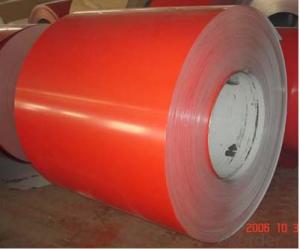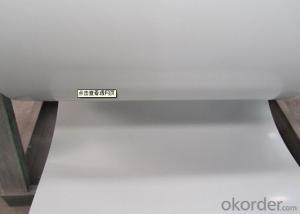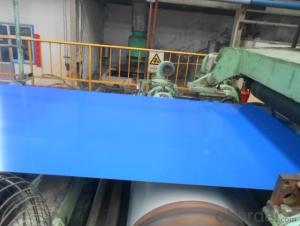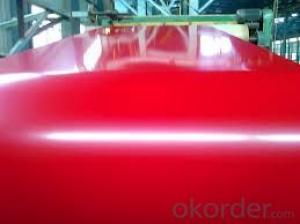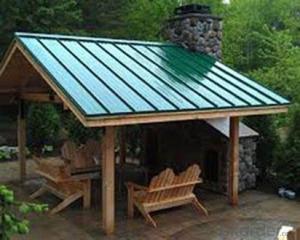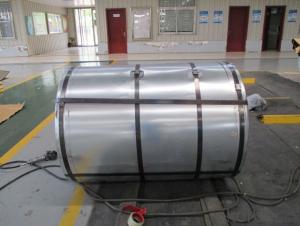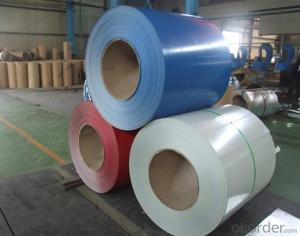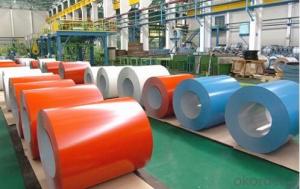Pre-Painted Galvanized Steel Roofing Sheet PPGI
- Loading Port:
- China main port
- Payment Terms:
- TT OR LC
- Min Order Qty:
- 25 m.t.
- Supply Capability:
- 10000 m.t./month
OKorder Service Pledge
OKorder Financial Service
You Might Also Like
Product Description
Product | Galvanized | PPGI | Contour plate
| Camouflage plate | |
Certificate | ISO9001,ISO14001 | ||||
Standard | ASTM A526 JIS G3302 | ASTM A525 JIS G3312/3322 | - - | - - | |
Gade | CGCC/CGLCC CGCH/CGLCH CGC340-570 CGLC400-570 | SGCC/CS/DX51D SGCH | - - - - | - - - - | |
Model | Thick:0.11-1.0mm Width:600-1250mm | Thick:0.14-3.5mm Width:600-1250mm | Thick:0.14-3.0mm Width:600-1250mm | Thick:0.14-3.5mm Width:600-1250mm | |
Type | Roil/Coil Sheet/Plate Corrugated Sheet | Roil/Coil Sheet/Plate Corrugated Sheet |
Corrugated Sheet | Roil/Coil Sheet/Plate Corrugated Sheet | |
Coil Weight | 3-8t | ||||
Surface Finish | Regular Spangle | Pre-painted | Pre-painted | Pre-painted | |
Application | Roofing,Structural,Commercial use,Household Applicnce,Industry,Others | ||||
Special Application
| Wear resdentant steel,High-strength-steel plate | ||||
Name | GI / GL / PPGI / PPGL |
Full name | Galvanized ,Galvalume,Pre-paited galvanizing,Pre-paited galvalume |
Basic material | Cold Roll |
Color of the PPGI and PPGL | Any color in RAL |
Standard | AISI, ASTM, BS, DIN, GB, JIS |
Spangle | Normal / Min / Zero |
Brand Name | |
Thickness | 0.6mm |
Width | 600mm to 1250mm |
Length | According to customers |
Surface Treatment | Hop-dipped Galvanized |
AZ coating | 50-275g/m2 |
Spangle | Normal/Min/Zero |
Minimum order | 25 Metric Tons |
Place of Origin | Shandong, China(Mainland) |
Packing | Fully Applicable for exporting seaworthy packing of horizontal type on wooden skids |
Price terms | FOB Qingdao |
Terms of payment | T/T, L/C or T/T and L/C |
Delivery Detail | within 7-25 days after receiving pre-payment (as per the order quantity) |
Coil ID | 508mm/610mm |
Coil Weight | 3-5 tons |
Supply Ability | 30000MT per month |
Application | Construction Structure, roofing, commercial use, household appliance, industry- |
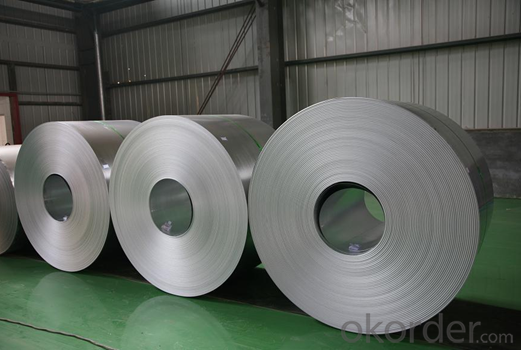
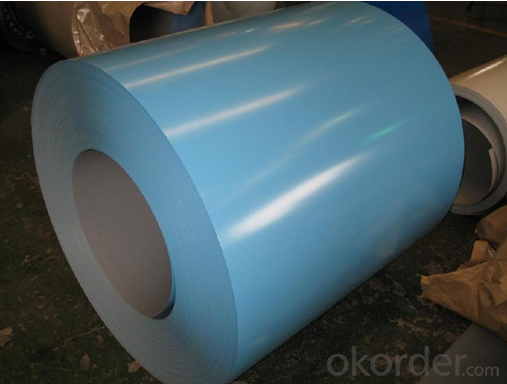
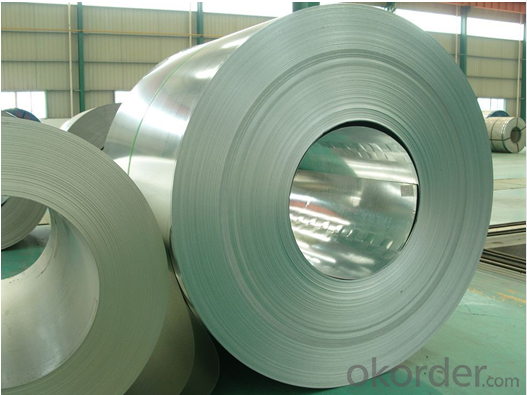
FAQ
1.What's your MOQ?
25MT, it is for one container.
2.Do you have QC teams?
Yeah, sure, our QC team is very important, they will keep the quality control for our products.
3. What's your normal delivery time?
Our delivery time about 10-20days for standard sizes, if you have other requirements like hardness and width ,it is about 20-40days. But don't worry ,we also try our best for the delivery time ,because time longer and our cost is higher.
- Q: How are steel coils inspected for formability using forming tests?
- Steel coils are inspected for formability using forming tests by subjecting them to various forming processes such as bending, stretching, or deep drawing. These tests help evaluate the ability of the steel to undergo deformation without cracking or tearing. The formed samples are then inspected for any defects or imperfections, such as surface irregularities, fractures, or wrinkling. This allows manufacturers to assess the quality and suitability of the steel coils for specific applications, ensuring they meet the required standards of formability.
- Q: Does anyone know what is 12 gage Cold Rolled Steel meaning? Also, help me to describe it.Thank you so muck ~!Mark Lin
- It's gauge.
- Q: Can steel coils be coated with holographic patterns?
- Yes, steel coils can be coated with holographic patterns. This process involves the application of a holographic film or coating onto the surface of the steel coils, creating a visually appealing and unique holographic effect. This coating can be used for various purposes such as branding, security, or aesthetics in industries like automotive, packaging, or electronics.
- Q: How do steel coils contribute to the circular economy?
- Steel coils contribute to the circular economy by enabling the recycling and reuse of steel. When products reach the end of their life cycle, steel coils can be easily melted down and repurposed to create new products. This reduces the need for extracting virgin materials, saves energy, and minimizes waste. Additionally, the durability and long lifespan of steel coils ensure that they can be used in multiple cycles, further promoting a sustainable and circular approach to manufacturing and consumption.
- Q: What is stainless steel 316, and what are its properties and uses?
- For machined aspects 416 cautioned. For welded aspects 316 is cautioned. besides the shown fact that 316 supplies a greater advantageous corrosion resistance. oftentimes the only benefit for 416 is machinability others than that 316 is greater advantageous
- Q: I'm trying to buy a Survival,tactical knife but don't know what steel is better
- Vanadium Steel Knives
- Q: Can steel coils be coated with PVC?
- Yes, steel coils can be coated with PVC. PVC coating provides added protection against corrosion and increases durability and longevity of the steel coils.
- Q: I know sterling silver can tarnish, so I was just wondering, how does stainless steel hold up?
- This Site Might Help You. RE: How durable is stainless steel jewelry? I know sterling silver can tarnish, so I was just wondering, how does stainless steel hold up?
- Q: How are steel coils protected from condensation?
- Steel coils are typically protected from condensation by applying a thin layer of oil or another corrosion-resistant coating to the surface. This acts as a barrier, preventing moisture from coming into direct contact with the steel and minimizing the risk of condensation forming. Additionally, the coils are often stored in a controlled environment with proper ventilation to minimize humidity levels and prevent condensation from occurring.
- Q: I have a steel string, Yamaha acoustic guitar that I am learning to play at home. But at school I use a rented nylon string guitar. I like the feel of the nylon strings better then the steel strings and i was wondering if i can just switch strings or if i should just get another guitar. Can anyone help?
- confusing thing. query using bing and yahoo. this will help!
Send your message to us
Pre-Painted Galvanized Steel Roofing Sheet PPGI
- Loading Port:
- China main port
- Payment Terms:
- TT OR LC
- Min Order Qty:
- 25 m.t.
- Supply Capability:
- 10000 m.t./month
OKorder Service Pledge
OKorder Financial Service
Similar products
Hot products
Hot Searches
Related keywords
